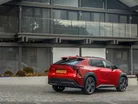Are Toyota’s EV batteries providing more charge than needed?

It was noted in mid-June that Toyota is working on new battery technologies to extend the range of electric vehicles (EVs)—most likely those to appear in its range now the company is refocused on electrification.
As its future EV plans begin to take shape, Japanese original equipment manufacturer (OEM) is also developing a battery expected to achieve 932 miles (1,500 km) of range per charge, which is something yet to be experienced—and goes beyond Mercedes Benz’s applied result that exceeded 620 miles (1,000 km).
From 2026, the company is looking to match this, by increasing the energy density of its batteries while reducing weight, and working on the aerodynamics of its vehicles—all of the things that Mercedes seems to present so well. Alongside this, cost-cutting will also claw back some of the company’s lost time as it plans to reduce the cost of bZ4X EV by 20% and make it charge faster.
"What we want to achieve is to change the future with BEVs," says Takero Kato, President of the new Toyota EV unit BEV Factory.
"We will launch the next-generation battery EVs globally and as a full line-up on the market from 2026.”
Changing the course of history through battery innovation
As range is such an important factor surrounding EVs, we decided to ask around to find out what the requirements are from drivers themselves. The reason for this is to truly understand what changes they want to see in the industry and where batteries and range are the only factors affecting their mobility needs.
We asked the audience the following question:
What is your EV range requirement (per charge)?
- Up to 100 miles
- 100 to 250 miles
- 250 to 400 miles
- +400 miles
The result shows us that drivers aren’t necessarily driven towards the idea of having an excessive amount of range, as shown by the below results:
What is your EV range requirement (per charge)?
- Up to 100 miles - 6%
- 100 to 250 miles - 28%
- 250 to 400 miles - 51%
- +400 miles - 15%
So why build batteries that are capable of reaching 621 miles on a single charge?
The innovation that comes from Toyota’s work will allow battery technology to be used in multiple applications and what isn’t expelled by range could be transferred to other functions, making EVs more comfortable or efficient or enabling more computing power for autonomous systems. Aside from this, the battery energy density achieved by Toyota will hopefully enable a reduction in size, quantity of materials, and therefore, costs.


